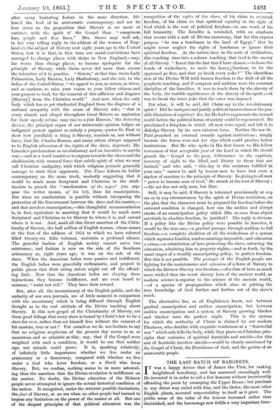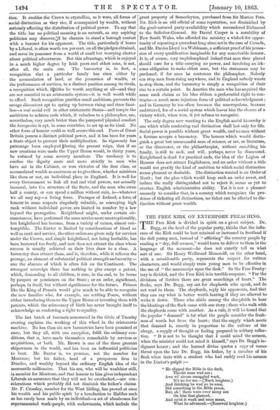THE LAST BATCH OF BARONETS.
I T was a happy device that of James the First, for making
knighthood hereditary, and has answered exceedingly well. He invented it in order to sell a few honours without irretrievably offending the peers by swamping the Upper House ; but purchase in any direct way ended with him, and the Order, like most other English plants, accreted respectability to itself as it grew. The public sense of the value of the honour increased rather than diminished, and the baronetage now fulfils a very important func- tion. It enables the Crown to crystallize, as it were, all forms of social distinction as they rise, if accompanied by wealth, without seriously affecting the distribution of political power. To say that the title has no political meaning is an untruth, as any aspiring politician may discover,:if he chances to stand a borough contest with a baronet for his opponent. The title, particularly if borne by a Liberal, is often worth ten per cent. on all the pledges obtained, and saves its possessor from a world of small but worrying chatter about political adventurers. But this advantage, which is enjoyed in a much higher degree by Irish peers and eldest sons, is not, after all, the main one. The baronetcy is, in fact, a recognition that a particular family has risen either by the accumulation of land, or the possession of wealth, or the performance of services, to a distinct position among its rivals, a recognition which, ifititles be worth anything at all—and they are not essential to an aristocratic system—it is well worth while to afford. Such recognition gratifies small ambitions, prevents the savage discontent apt to spring up between rising and risen fami- lies—a real social evil in other aristocratic States—and tempts the ambitious to achieve ends which, if valueless to a philosopher, are, nevertheless, very much better than the pampered physical comfort the bourgeoisie is apt, in some countries, to set up as its ideal. No other form of honour could so well secure this end. Peers of Great Britain possess a distinct political power, and it has been for years a State object to prevent their multiplication. So rigorously has patronage been employed [during the present reign, that if no new creations were made the Upper House would, in thirty years, be reduced by some seventy members. The tendency is to confine the dignity more and more strictly to men who have sat in the Cabinet, or won victories of the first class, or accumulated wealth so enormous as to give them, whether ministers like them or not, an individual place in England. It is well for every Government to link all real and vital powers, not actually immoral, into the structure of the State, and the man who owns half a county, or can spend a million without ruin, is—whatever we all may say—a living force. Peerages of Ireland, a form of honour in some respects singularly valuable, as conveying high rank without individual power, are limited in number by a law beyond the prerogative. Knighthood might, under certain cir- cumstances; have performed the same service more unexceptionably, but knighthood has become, from a variety of causes, almost con- temptible. The Garter is limited by considerations of blood as well as rank and service, the other orders are given only for services under the Crown, and simple knighthood, not being heritable, has been bestowed too freely, and now does not attract the class whose success is usually achieved as their lives draw to a close. A baronetcy does attract them, and is, therefore, while it relieves the peerage, an element of substantial political strength and security— one the absence of which is often felt on the Continent. The strongest sovereign there has nothing to give except a patent, which, descending to all children, is sure, in the end, to be borne by paupers or pensioners on the State ; or an order, significant, perhaps, in itself, but without significance for the future. Princes like the King of Prussia would give much to be able to recognize the new families who, for example, are settling Posen, without either introducing them to the Upper House or investing them with patents, which the aristocracy of birth has never brought itself to acknowledge as conferring a right to equality.
The last batch of baronets announced in the Globe of Tuesday evening explains the working of this wheel in the aristocratic machine. No less than six new baronetcies have been promised at once, but they all, with one exception, full the ordinary con- ditions, that is, have made themselves remarkable by services or acquisitions, or both. Mr. Brown is one of the three greatest shipowners in the world, and has been an influential politician to boot. Mr. Baxter is, we presume, not the member for Montrose, but his father, head of a prosperous firm in Dundee, and wealthy beyond the ordinary English idea of the mercantile millionaire. That his son, who will be wealthier still, is member for Montrose, and that honour to him gives independent Liberals an assurance that they will not be overlooked,—are con- siderations which probably did not diminish the father's claims Mr. F. Crossley, member for the West Riding, has proved at once his wealth and his public spirit by a benefaction to Halifax such as has rarely been made by an individual—a set of almshouses for superannuated work-people, with endowments, which include the great property of Somerleyton, purchased from Sir Morton Peto. Mr. Rich is an old official of some reputation, not diminished by the good-natured party-availability which surrendered Richmond to the Solicitor-General. Sir Daniel Cooper is a notability of New South Wales, who afforded the ministry a wished-for oppor- tunity of repeating a precedent long since set in the case of Canada,. and Mr. Davies Lloyd is a Welshman, a sufficient proof of his posses- sion of every qualification imaginable for any conceivable honour.. It is, of course, very unphilosophical indeed that men thus placed' should care for a title carrying no power, and involving an irk- some obligation to make eldest sons, but the statesman may be pardoned, if for once he contemns the philosopher. Nobody can stop men from rising anywhere, and in England nobody wanta to stop them, and the baronetcy is simply a recognition of their- rise to a certain point. In America the man who has acquired the- same rank claims as his blue ribbon a preferential right to con- tracts—a much more injurious form of political acknowledgment ; and in Germany he too often becomes the unscrupulous, because embittered, foe of a social system which leaves him the chance of a victory which, when won, it yet refuses to recognize.
The only degree now wanting to the English social hierarchy is, one which while conferring real distinction shall last only for life. Social power is possible without great wealth, and no man without a fortune accepts a baronetcy. The honour which would distin- guish a great but unsuccessful man of science, or art, or literature, or the discoverer, or the philanthropist, without ennobling his family, is still to seek, and will, perhaps, never be discovered. Knighthood is dead for practical ends, the idea of the Legion of Honour does not attract Englishmen, and an order without a title would not gratify the kind of ambition to which social distinction seems pleasant or desirable. The distinction wanted is an Order of Merit ; but the plan which would keep such an order sweet, and induce the really distinguished not to reject it, seems as yet to- overtax English administrative ability. Yet it is not a pleasant anomaly to consider that, in a country which recognizes the pru- dence of ticketing all distinctions, no ticket can be allotted to dis- tinction without great wealth.































 Previous page
Previous page